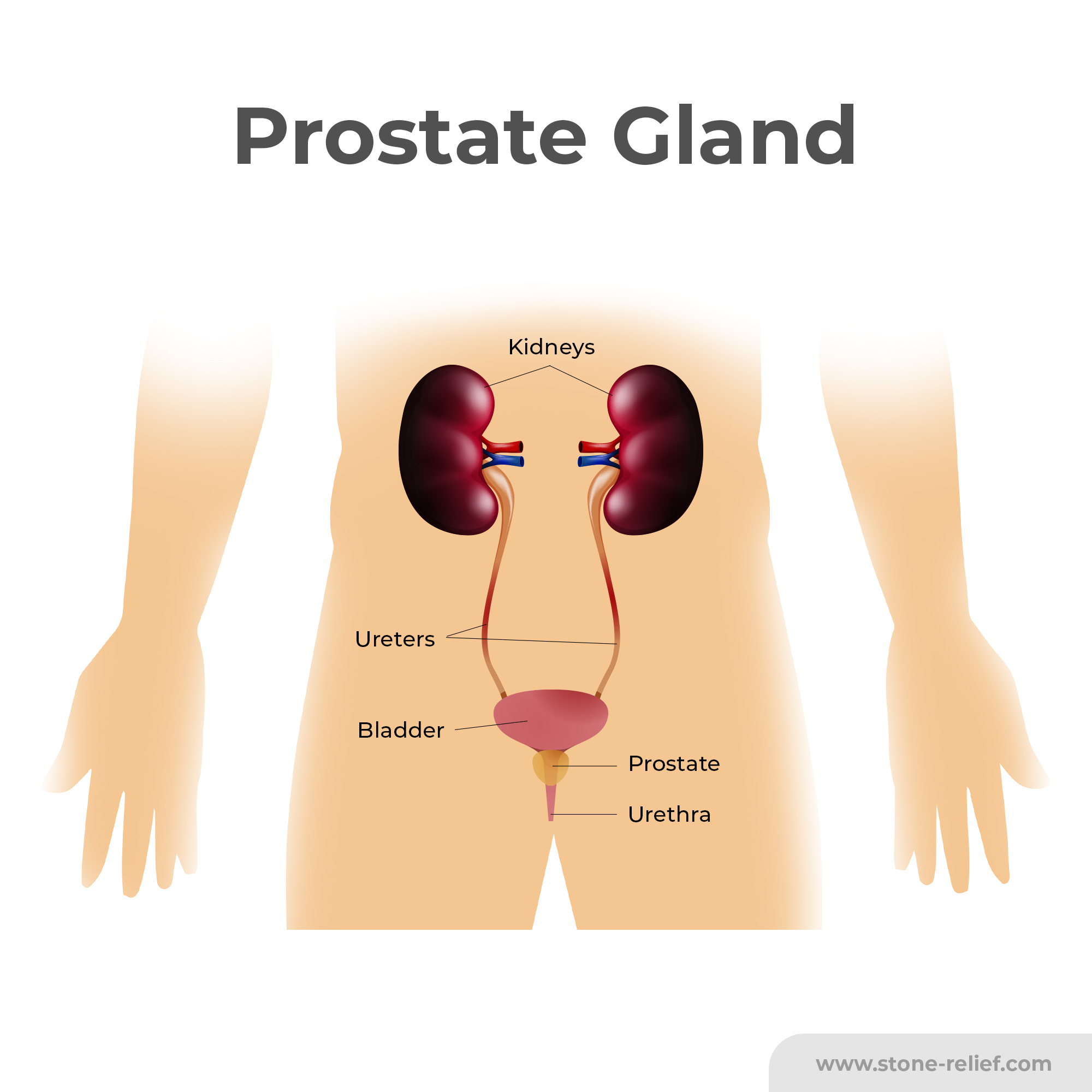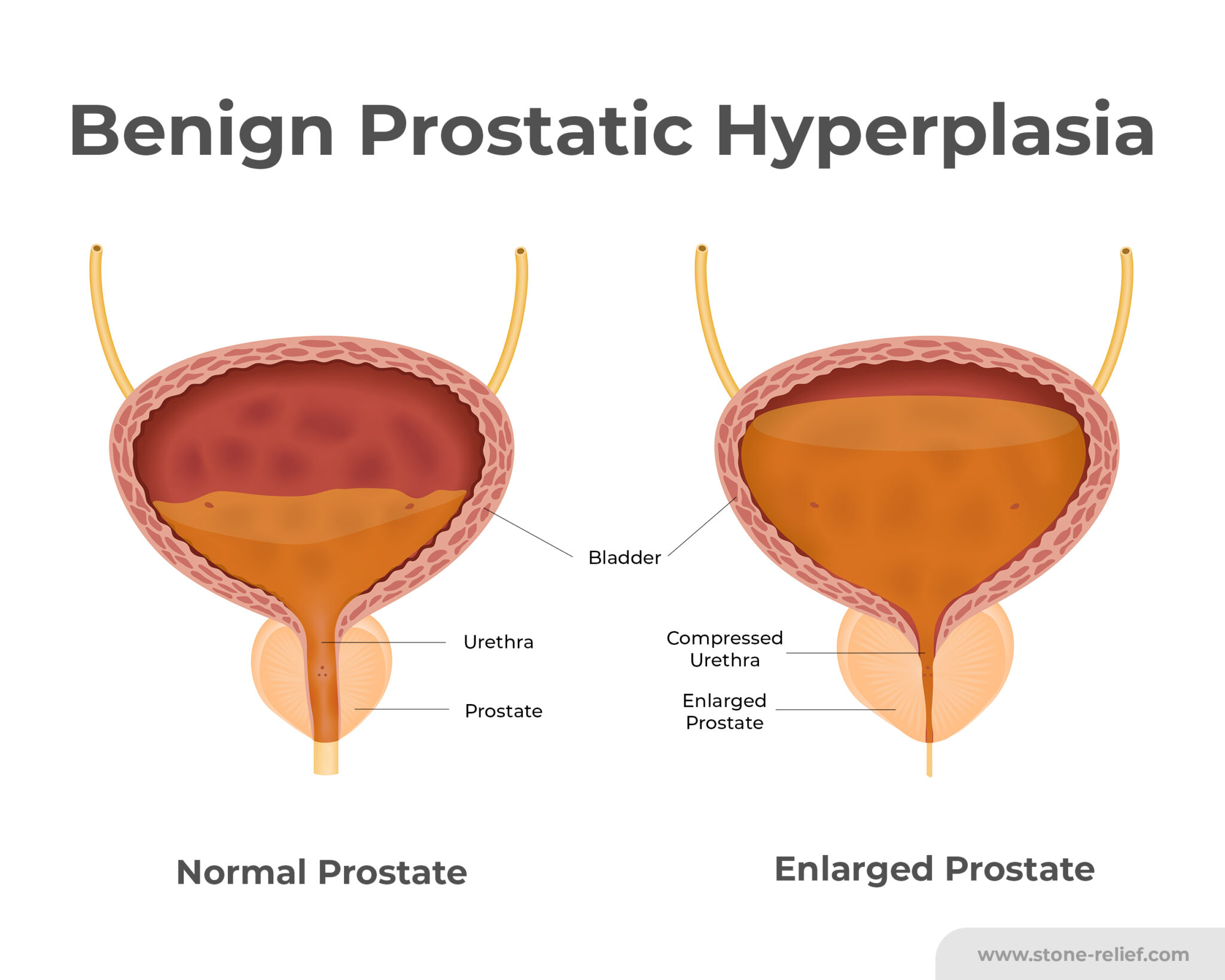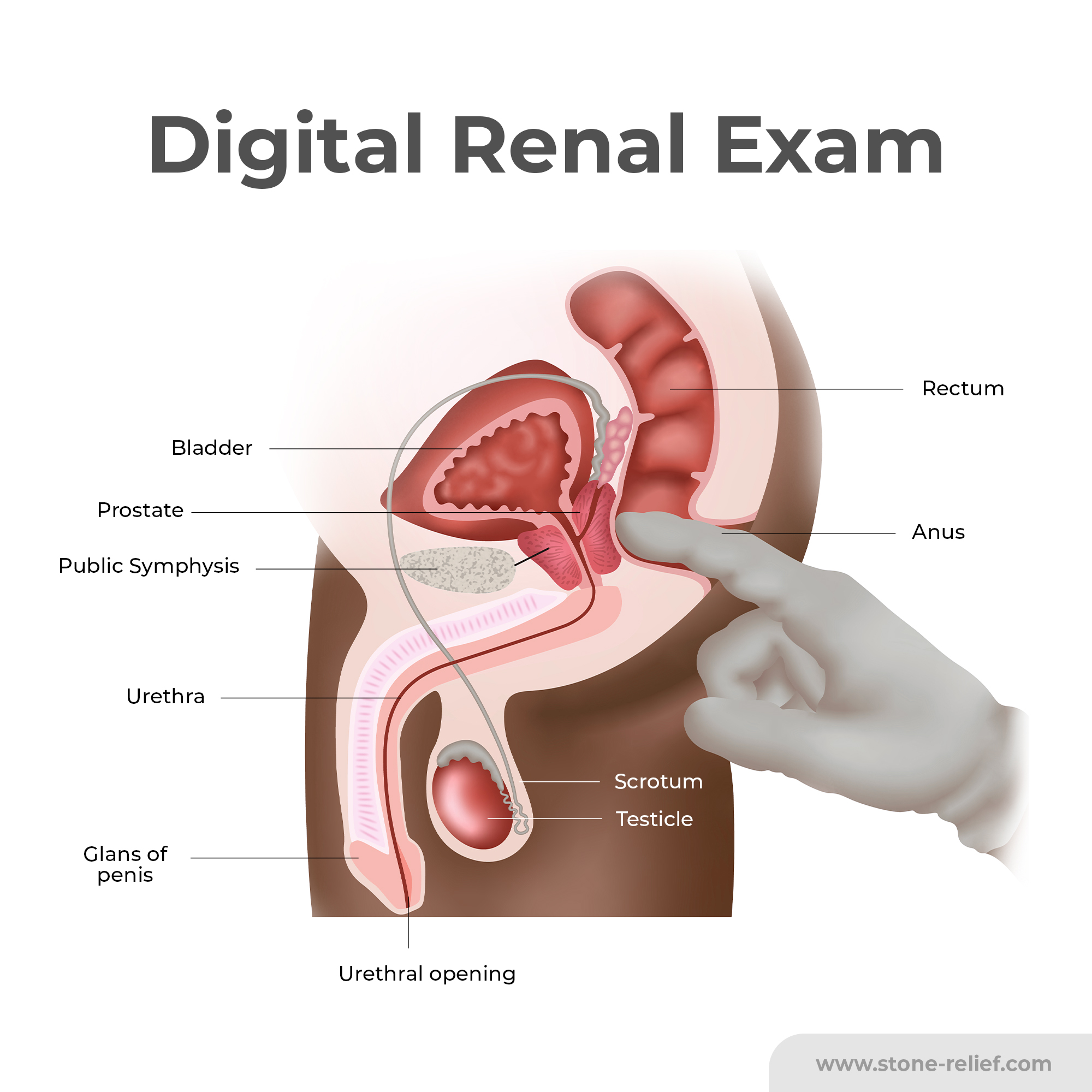Published: March 31, 2024 | 1 min read
Can Prostate Enlargement Lead to Kidney Stones?
ARTICLE SHORTCUTS
- CAUSES OF PROSTATE ENLARGEMENT
- HOW IS PROSTATE ENLARGEMENT RELATED TO KIDNEY STONES?
- SYMPTOMS OF PROSTATE ENLARGEMENT
- HOW TO TEST FOR BPH
- TIPS TO DECREASE STONE RISK AMONG BPH PATIENTS
Benign prostatic hyperplasia (BPH), known as prostate hypertrophy or enlargement, is common in older men. The prostate gland is a walnut-like gland that helps produce semen in males. It surrounds the urethra, a tube-like structure that carries semen and urine out of the bladder. Around 50% of men aged 51 to 60 are affected by this condition. This percentage rises to 70% at ages 60 to 69 and approximately 80% over 70 years.
Unfortunately, BPH directly affects urine flow in men. Since our urine carries waste products, including stone-forming elements, any obstruction in urine flow is a risk factor in stone formation. In fact, 10% of BPH patients are diagnosed with bladder stones.

CAUSES OF PROSTATE ENLARGEMENT
If you ask doctors, they won’t give a clear answer as to what causes BPH exactly, and men younger than 40 rarely have symptoms. This led to the suspicion that changes in male hormone levels due to aging are the major players in BPH development. Nevertheless, we listed below the possible reasons for prostate enlargement:
Excess dihydrotestosterone (DHT)
The prostate gland converts testosterone into another hormone called dihydrotestosterone (DHT) by the enzyme 5-alpha-reductase. It helps maintain sexual desire, produces sperm, and aids the development of male secondary sexual characteristics during puberty (e.g., deepening of voice). This hormone is also known to stimulate the growth of the prostate gland and the cells within it. In other words, DHT is the more potent form of testosterone.
While the overall level of testosterone in the body decreases with age, the level of DHT within the prostate may remain high. This imbalance between circulating testosterone and localized DHT production within the prostate can lead to excessive growth of prostate cells. Also, as men age, a relative increase in estrogen levels may lead to imbalance.
Underlying conditions
According to studies, men with erectile dysfunction (ED) are 1.33 to 6.24 times more likely to have benign prostatic hyperplasia (BPH) than those without ED. Erectile dysfunction, also known as impotence, is a condition where a man cannot achieve an erection during sexual intercourse.
ED is likely a result of health conditions constricting blood flow, such as cardiovascular diseases (affect blood vessels), hypertension, tobacco use, metabolic disorders (e.g., obesity and diabetes), and sedentary lifestyle. All these are highly connected to unhealthy diet (e.g., Vegetarian and Western Diets).

HOW IS PROSTATE ENLARGEMENT RELATED TO KIDNEY STONES?
Typically, the prostate gland grows throughout a man’s life. This is due to the gradual increase in DHT levels. It is necessary for normal male development, but elevated levels of DHT or excessive sensitivity of tissues to DHT can lead to an enlarged prostate later in life. That’s because a protective layer of tissue surrounding the prostate gland prevents it from expanding outward. As a result, the prostate gland grows inward, exerting pressure on the urethra like a clamp. This leads to reduced urine flow.
When urine flow is obstructed, waste products are not released well in the body. This allows stone-forming materials like oxalates (a plant compound) to bind with other elements to form stones. Although this urinary retention often leads to stone formation in the bladder rather than the kidneys, the bottom line is that you will still form stones. This connection was observed in a study conducted among 94 patients with BPH who also developed bladder stones. Furthermore, when the urethra is compressed, it will be harder to pass any current stones in your urinary tract.
Also, BPH patients are more likely to experience urinary tract infections (UTIs). UTIs can promote the formation of specific kidney stones, such as struvite stones, often associated with bacterial infections. There are two probable causes of UTIs among BPH patients:
- Urinary retention – Stuck urine can be a breeding ground for bacteria
- Indwelling catheters or stents – The length of time that catheters or stents are placed inside your urinary tract to drain stuck urine can increase the presence of bacteria
SYMPTOMS OF PROSTATE ENLARGEMENT
Since an enlarged prostate causes the urethra to squeeze, it will block urine flow in time. Thus, it will cause several symptoms, including:
- Frequent urination
- Difficulty starting or stopping urination
- Weak urine stream
- Incomplete bladder emptying
- Discomfort or pain in your belly
- Pain in your penis or scrotum
- Pain while urinating or after ejaculation
- Urine has an unusual color or smell (due to bacteria)
- Fever, chills, or body aches (due to infection)
When you experience any of the following signs, it is best to test for BPH. Especially if you can’t urinate at all, get medical help right away. This is commonly due to taking certain cold or allergy medications.

HOW TO TEST FOR BPH
Testing for an enlarged prostate can be done through the following:
Digital rectal exam – Your doctor will insert a gloved finger into the rectum to feel the portion of the prostate gland that is closest to the rectum
- Urine flow study (urodynamic test) – Measures how much and how quickly the urine flows.
- Ultrasound – Uses high-frequency sound waves to create images of the prostate gland
- Cystoscopy – Involves the use of a cystoscope, a thin and flexible tube with a light and a camera on the end
Several symptoms of an enlarged prostate gland can overlap with those associated with prostate cancer. This means that an individual with an enlarged prostate might also have undetected prostate cancer. However, it’s important to note that having an enlarged prostate gland doesn’t necessarily increase the chances of getting prostate cancer.
If you also want to be tested for prostate cancer, you can undergo the following:
- Prostate Biopsy – Collects small prostate tissue samples for prostate cancer laboratory analysis
- Prostate-specific antigen (PSA) blood test – Evaluates a specific protein produced by the prostate gland to check for cancer-related prostate enlargement
TIPS TO DECREASE STONE RISK AMONG BPH PATIENTS
BPH is likely a result of hormonal imbalance and underlying conditions due to constricted blood flow and metabolic disorders. Fixing these disorders will help prevent or at least slow down the enlargement of your prostate.
Nevertheless, urine obstruction only accounts for about 3-8% of kidney stone cases among BPH patients. So, it’s not the primary reason for stone formation. DIET is the real player that primarily affects your stone risk. Notably, eating diets rich in plant matter causes most (80%) kidney stone cases due to oxalate content. Oxalates bind with calcium in the urine to form stones. Since urinary retention is a typical result of BPH, you must eliminate oxalates in your diet.
If you want to fix your health to prevent kidney stones and solve your other health conditions that are probably firing up your risk, check out our Coaching Program. This will surely guide your diet and lifestyle to stop kidney stones and reclaim your overall health.
REFERENCES
- Enlarged Prostate Gland
- Prostate Problems
- Risk factors for bladder calculi in patients with benign prostatic hyperplasia
- The association of benign prostatic hyperplasia with lower urinary tract stones in adult men: A retrospective multicenter study
Comments or questions?
Responses
You must be logged in to post a comment.

Very informational. Thank you!